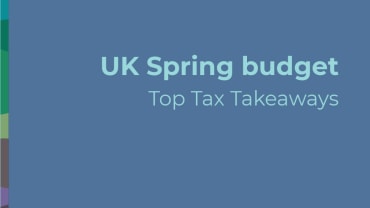Here are our top tax takeaways from the UK Spring Budget delivered today by Chancellor Jeremy Hunt.
- The maximum amount that individuals can pay into their pensions (annually) from 6 April 2023 will increase from £40,000 to £60,000. As before, that limit is tapered. The income level at which tapering begins has increased from £240,000 to £260,000. The tapering is restricted so that a minimum contribution is allowed and that increases from £4,000 to £10,000.
- The pensions lifetime allowance (LTA) will be abolished. The LTA is the maximum amount pension savings can grow to and stay tax free, with any excess taxed at 55%. From 6 April 2023, the tax charge will be removed and at a future point legislation will abolish the LTA.
- From April 2023 the capital allowances rules will allow for a limited "full expensing" regime. The full expensing regime will initially run for three years (to April 2026) and may be extended permanently in the future. Under full expensing, companies will be able to deduct 100% of the cost of capital expenditure on new "main rate" plant and machinery; and 50% of the cost of "special rate" plant and machinery. Note that full expensing does not wholly replace the capital allowances regime. Non-incorporated businesses will still operate normal capital allowances, and full expensing does not apply to second hand assets or cars. There is no reversal of the decision to increase the headline rate of corporation tax from 19% to 25%. The increase will start from April 2023.
- In addition to full expensing, the annual investment allowance will be "permanently" set at £1m. Unlike full expensing, this will apply at 100% to "special rate" assets, unincorporated businesses and used assets.
- An increased rate of relief will be introduced from 1 April 2023 for loss-making R&D intensive small and medium size enterprises. Qualifying companies with R&D expenditure of at least 40% of total expenditure will receive £27 from HMRC for every £100 of R&D investment.
- Twelve Investment Zones will be established across the UK (including four across Scotland, Northern Ireland and Wales). Special tax sites in or connected with Investment Zones will benefit from a package of time limited tax reliefs including enhanced capital allowances for plant and machinery, enhanced structures and buildings allowances, employer’s NIC reliefs and (in England) SDLT reliefs. It remains to be seen whether the Scottish and Welsh governments will introduce corresponding LBTT and Land Transaction Tax reliefs.
- Income tax personal allowance (£12,570), rates and thresholds for rUK were set until April 2028 in Jeremy Hunt’s first Budget event, in October 2022. There was no change made to this in this Budget; as a reminder, in the December 2022 Scottish Budget, thresholds with the exception of that for the top rate (fixed at £125,140) were also frozen. But the Scottish higher rate and top rate were increased to 42% and 47% respectively. These rates will come into effect for Scottish taxpayers on earned and property income from 6 April 2023.
- Charitable tax reliefs will only be available to UK charities and UK Community Amateur Sports Clubs from 15 March 2023. Non-UK charities (including their donors and suppliers) will no longer qualify. However, there will be a transitional period until April 2024 for EU and EEA charities that HMRC has previously accepted as qualifying for relief.
- There was useful confirmation of some changes to capital gains tax in relation to the transfer of assets on the break-up of marriage or civil partnership. The splitting partners will, from 6 April 2023, have three years after the tax year of separation to transfer assets between themselves without a tax charge; and this will extend indefinitely where transfers are part of formal arrangements. In addition, a partner who has left the family home will be given an option to claim private residence exemption when it is sold; and a further relief may be available for shares of proceeds of sale if they are received after a sale of a house by an ex-partner to whom it has been transferred.
- The government has published a call for evidence on the tax treatment of the production and sale of ecosystem service units such as woodland carbon units, peatland carbon units, biodiversity units and nutrient migration credits. There are currently many areas of uncertainty about how the current tax and VAT system applies to these new environmental projects. The consultation also covers the current scope of inheritance tax agricultural property relief and whether this is a potential barrier to some landowners and farmers making a long-term land use change from agricultural to environmental use. The government is seeking views on the design of potential updates to agricultural property relief including the scope of the existing land habitat provisions.
Contributors
Karen Davidson
Partner
Isobel d'Inverno
Director of Corporate Tax
Alan Barr
Partner
Bob Langridge
Partner
Leigh Gould
Partner
Neil Ritchie
Director of Personal Tax
Laura Brown
Director of Personal Tax
Armando Goncalves
Senior Solicitor
Scott Bell
Senior Solicitor



















